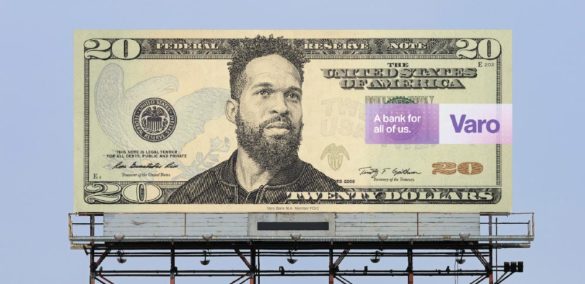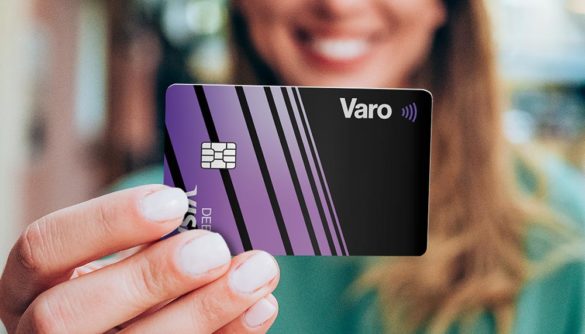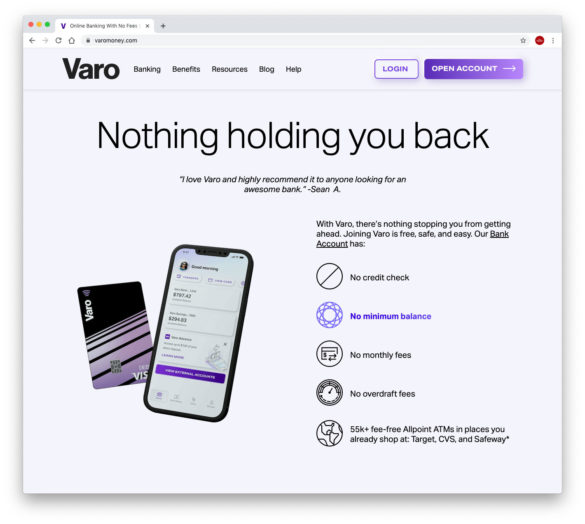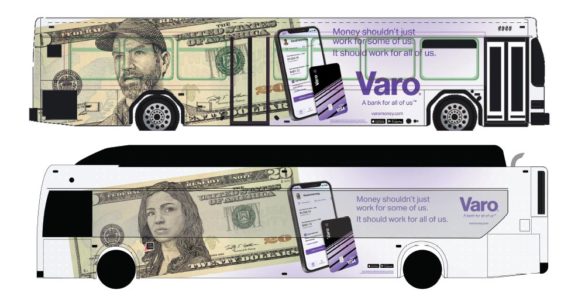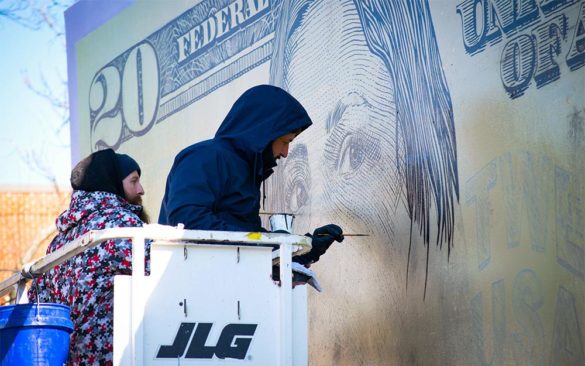Previously known as Varo Money, Varo Bank has kicked off a multi-million dollar branding campaign with TV spots airing during the Super Bowl in select markets.
In the campaign, Varo dubs itself “A Bank for All of Us,” leaning heavily on themes of inclusion as seeks to build recognition among people who feel neglected by traditional institutions. TV and radio spots include a strapline that echoes of social justice: “Money shouldn’t just work for some us. It should work for all of us.”
“The impetus for this branding campaign was to make the point that Varo is different,” says Halle Hutchison, Varo’s Chief Brand Officer. “We’re the only fintech with a national bank charter. That makes us sort of unique. We’re compared with a lot of other fintechs, which makes sense because we’re digital-centric and we have no branches.”
One critical aspect of Varo’s marketing strategy is avoiding ‘bankspeak’. Hutchison says consumers don’t like — or don’t understand — a lot of the industry lingo financial marketers often use.
“A while back, we were looking over a draft that referred to a ‘negative balance’,” says Hutchison. “We realized that no consumer speaks that way. That’s banker talk. Consumers would say, ‘I don’t have any money.’ We try to talk to our consumers the way they would talk to each other.”
Visual elements of the branding play off the push to put Harriet Tubman on on the $20 bill, a move that Varo supports. In multiple media, Varo puts the faces of ordinary people from its target audience on $20s.
Later in the campaign the bank plans to release an app that will enable anyone to put their face on the currency. In the Varo’s commercials people’s faces go from full-motion video to morph into an evocation of the engraved images appearing on U.S. currency.

Send the Right Offers to the Right Consumers
Achieve a better return on your marketing investment. Leverage behavioral data and analytics to target the right customers with the best possible offers.
Read More about Send the Right Offers to the Right Consumers

Why Industry Cloud for Banking?
PwC’s Industry Cloud for Banking helps deliver personalized products and services that today’s customers expect.
Read More: Varo: The First Nationally Chartered Fintech Bank
The Democratization of Banking
Varo founder Colin Walsh has described his inclusive vision for Varo as “the democratization of banking.”
“Having spent many years in the traditional financial services industry before founding Varo, I saw a world that catered mostly to the haves, and had little time for the have nots,” Walsh explains. “I made a personal choice to put my energy into building a more fair and just world, working with a talented, multi-cultural team to create a bank that is designed for all of us.”
Hutchison says the brand campaign reflects this sentiment, and sends an important message to those left financially vulnerable by the COVID pandemic.
“We aren’t making a bank that is just for people with steady jobs,” says Hutchison. “Now more than ever, people need greater financial resilience, and to be able to withstand the unexpected things that happen in life.”
She notes that Varo saw a huge surge in acquisition of new consumers when the U.S. government issued its first COVID stimulus payments in 2020 “because people needed a bank account to get their money faster.”
Varo offers a free account with a debit card. Varo allows customers to draw on advances at a graduated, low fee, with repayment required within 30 days. (There’s no charge for the smallest advances.)
But Hutchison says Varo won’t be a one-trick pony focused solely on transactional accounts. “We will eventually offer the full breadth of services that any brick and mortar bank can, and we’ll offer consumers the best of both worlds — the services and security of a real bank and the technology-centric features and benefits of a fintech,” Hutchison explains.
Highlighting Both National Reach and Local Connection
The first elements of the campaign began rolling out in channels like billboards and transit ads.
“We wanted to put the messaging in the neighborhoods where our customers and potential customers live,” says Hutchison.
The subtle message behind the billboards, bus wraps, transit and shelter signage and more was to stress being mobile-centric, “Varo really is everywhere,” according to Hutchison.
“We don’t have branches like a brick and mortar bank,” she continues, “but because we’re in the palm of your hand, we are in communities too. We’re sort of local and national at the same time.”
In locations where the talent was available, billboards were hand painted, rather than pasted up from pre-printed sections. It’s an older outdoor advertising technique, once called “painted bulletins,” that Hutchison says lent itself particularly well to the look and feel of the campaign.
Worth Noting
This all-digital fintech sees both value and need for some very traditional media channels like billboards, transit ad, TV and radio. It’s tricky (if not impossible) to build a brand entirely online.
“Often with outdoor advertising now it’s printed and pasted up or its digital,” explains Hutchison. “But when you can get those really unique urban placements where the billboards are hand-painted, there’s something that’s very noticeable and tactile about them that makes the message feel more like its part of the community.”
The initial images used in the TV commercial and the various $20s reproduced in multiple forms for the campaign consisted of professionals. In part this decision was made for the sake of controlling exposure in a COVID environment.
“Future rounds of the campaign are going to include our customers,” says Hutchison. “That was always planned for the campaign imagery, once it’s safe to get imagery of our customers again. We’ll put them in or out of home and other advertising.”
The commercials will also air on popular programs such as ABC’s “The Bachelor.” The bank is also running radio spots on shows popular with its demographic — one is Ryan Seacrest, who regularly runs promotional money prize contests, which are popular among the bank’s market.

Varo’s Audience Wants To Hear From Each Other
This inclusiveness in the bank’s marketing efforts follows on the strategy that it has been using on social media channels. Many of the posts that appear on Varo’s Twitter feed, for example, are postings about personal finance from consumers either organically or in response to bank’s call for input as part of social-media-centered contests. This is also a place that Varo “swag” shows up — such as white and purple Varo-branded t-shirts that have appeared in consumer postings.
“Our customers like to share their own stories, which is great for us because this gives us additional insight into their lives and helps us in turn develop more insightful creative,” says Hutchison.
Coinciding with the TV commercials’ launch is the bank’s “Varo for Tomorrow” sweepstakes. The bank asked consumers to share their savings goals. Winners will draw from a $100,000 fund set up to go into savings accounts.
“Our consumers are from a lower-income demographic and I find it really humbling what savings goals people share,” says Hutchison. “Some have a new child coming into the family. Sometimes they need to buy school supplies for their children. They love sharing with us, and sharing with each other.”

